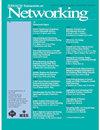EPIC: Traffic Engineering-Centric Path Programmability Recovery Under Controller Failures in SD-WANs
IF 3.6
3区 计算机科学
Q2 COMPUTER SCIENCE, HARDWARE & ARCHITECTURE
引用次数: 0
Abstract
Software-Defined Wide Area Networks (SD-WANs) offer a promising opportunity to enhance the performance of Traffic Engineering (TE). With the help of Software-Defined Networking (SDN), TE can promptly respond to traffic changes and maintain network performance by leveraging a global network view. One of the key benefits of SDN for TE is path programmability, which is empowered by SDN controllers to enable dynamic adjustments of flows’ forwarding paths. However, controller failures pose new challenges for SD-WANs since path programmability could be decreased due to the increasing number of offline flows, leading to potential TE performance degradation. Existing recovery solutions mainly focus on recovering path programmability for improving unpredictable network performance but cannot guarantee consistently satisfactory TE performance as expected, since path programmability can only indirectly evaluate network performance. In this paper, we propose EPIC to ensure robust TE performance under controller failures. We observe that frequently rerouted flows could greatly influence TE performance. Enlightened by this, EPIC introduces a novel metric called the TE performance-centric ratio to assess the relevance of different path programmability values for TE performance. The key idea of EPIC lies in identifying frequently rerouted flows during TE operations and prioritizing recovery of the path programmability of these flows under controller failures. We formulate an optimization problem to maximize TE performance-centric path programmability and propose an efficient heuristic algorithm to solve this problem. Evaluation results demonstrate that EPIC can improve average load balancing performance by up to 55.6% compared with baselines.sd - wan中控制器故障下以流量工程为中心的路径可编程性恢复
软件定义广域网(sd - wan)为提高流量工程(TE)的性能提供了一个有希望的机会。借助软件定义网络(SDN), TE可以利用全局网络视图,快速响应流量变化并维护网络性能。用于TE的SDN的关键优势之一是路径可编程性,这是由SDN控制器授权的,可以动态调整流的转发路径。然而,控制器故障给sd - wan带来了新的挑战,因为由于离线流数量的增加,路径可编程性可能会降低,从而导致潜在的TE性能下降。现有的恢复方案主要侧重于恢复路径可编程性,以改善不可预测的网络性能,但由于路径可编程性只能间接评估网络性能,因此无法保证始终如一地满足预期的TE性能。在本文中,我们提出了EPIC来确保控制器失效时的鲁棒TE性能。我们观察到频繁重路由的流可能会极大地影响TE性能。受此启发,EPIC引入了一种称为TE性能中心比率的新度量,以评估不同路径可编程性值与TE性能的相关性。EPIC的关键思想在于识别TE操作期间频繁重路由的流,并在控制器故障时优先恢复这些流的路径可编程性。我们提出了一个优化问题来最大化以TE性能为中心的路径可编程性,并提出了一个有效的启发式算法来解决这个问题。评估结果表明,与基线相比,EPIC可以将平均负载平衡性能提高55.6%。
本文章由计算机程序翻译,如有差异,请以英文原文为准。
求助全文
约1分钟内获得全文
求助全文
来源期刊

IEEE/ACM Transactions on Networking
工程技术-电信学
CiteScore
8.20
自引率
5.40%
发文量
246
审稿时长
4-8 weeks
期刊介绍:
The IEEE/ACM Transactions on Networking’s high-level objective is to publish high-quality, original research results derived from theoretical or experimental exploration of the area of communication/computer networking, covering all sorts of information transport networks over all sorts of physical layer technologies, both wireline (all kinds of guided media: e.g., copper, optical) and wireless (e.g., radio-frequency, acoustic (e.g., underwater), infra-red), or hybrids of these. The journal welcomes applied contributions reporting on novel experiences and experiments with actual systems.
 求助内容:
求助内容: 应助结果提醒方式:
应助结果提醒方式:


